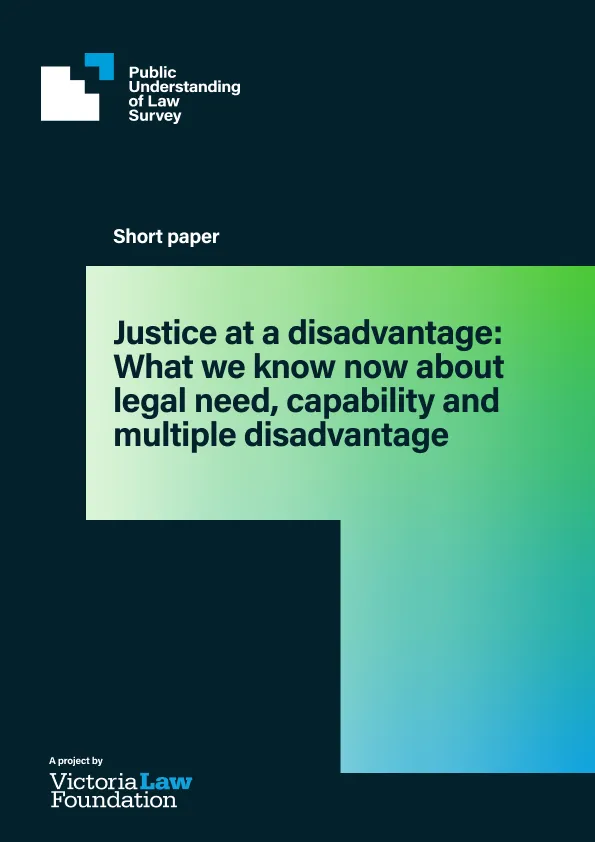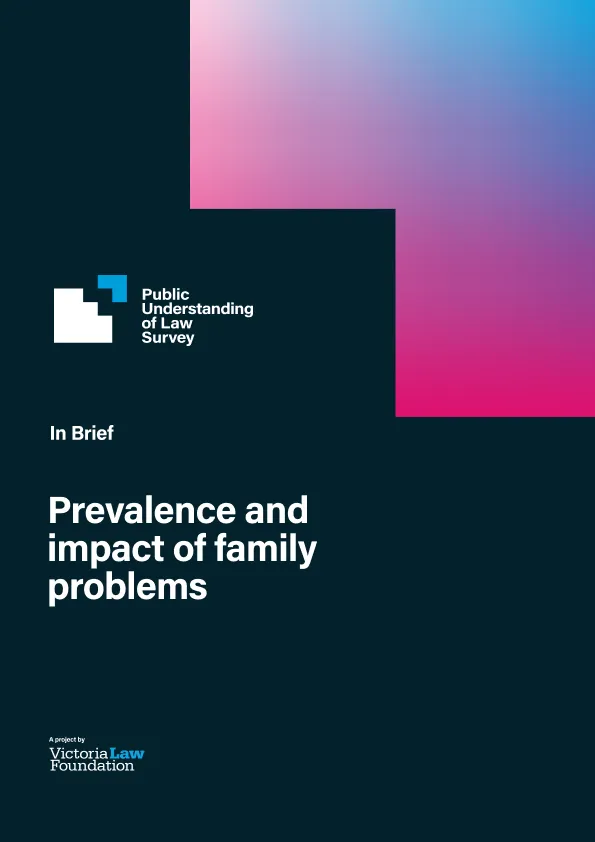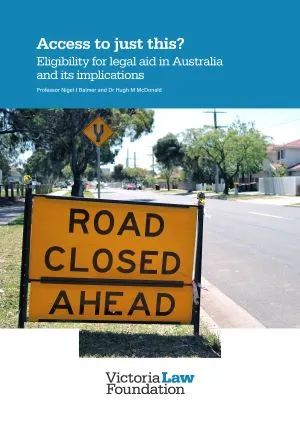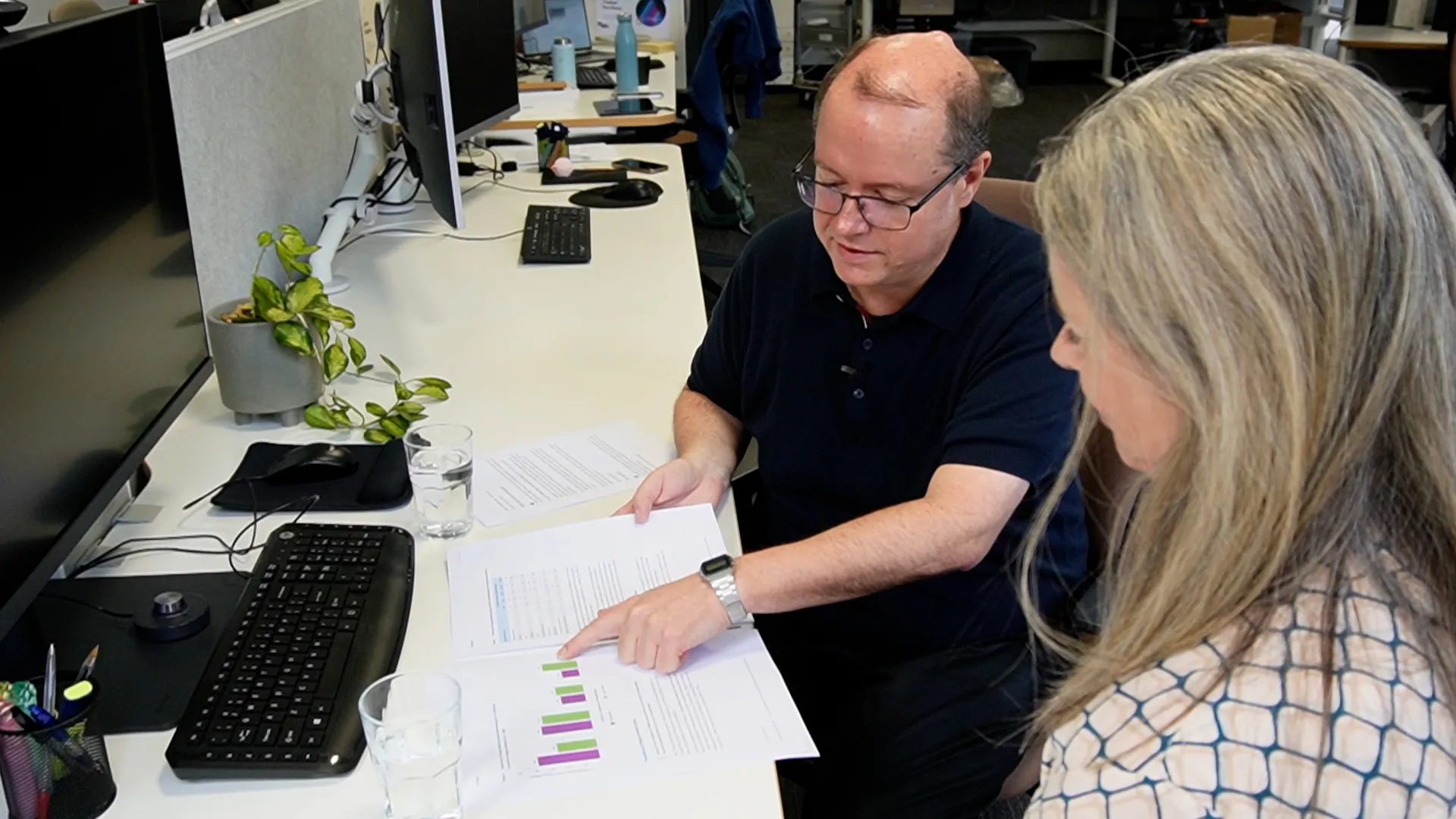Recent publications
Explore our range of publications interrogating the legal need, capability and access to justice.
This short paper investigates the interplay of disadvantage, legal need, and legal capability in Victorians experiencing legal problems.

A PULS In brief publication about the resolution and outcomes of family problems exploring how Victorians experience and resolve their family problems.

A PULS In brief publication about the prevalence and impact of family problems exploring how Victorians experience and resolve their family problems.

This paper discusses the challenges and implications of legal aid eligibility in Australia and calls for increased funding, less stringent means tests, and redesigned entry points to legal assistance, to improve access to justice.

Research projects
Our projects cover institutional and general public perspectives.
A Victoria-wide survey to understand how people see, understand and engage with the law.

Exploring targeted and effective people-centred services that are meeting legal needs across the Victorian justice and legal assistance sector.

Mapping institutional data across a broad range of civil justice bodies.

A survey of the community legal centre workforce across Victoria.

Research News
Research Principles
Our research focuses on the legal and related needs of Victorians.
Impact
We undertake useful research to support improved civil legal services for Victorians.
Rigour
We use sound methodologies and rely on clear evidence for any conclusions.
Collaboration
We work in a collaborative way with the legal sector, civil society and others in the interests of access to justice for Victorians.
Communication
We make our reports publicly available and engage with the sector on research activity.
Independence
We maintain our independence.
Research plan
Our research divided into four streams, which each produce complementary outcomes.
Mapping justice
Looking at the availability and content of institutional data across a broad range of civil justice bodies, to understand how legal matters progress, see possible issues with legal processes and identify barriers to access to justice.
Surveying legal literacy
Discovering what Victorians know about their justice system, its institutions and the role they see it play in their lives.
Researching programs and interventions
Taking a rigorous empirical approach to evaluate the need for different legal services, as well as their processes, impacts and outcomes, so that we can figure out 'what works.'
Coordinating and sharing research
Connecting the justice, community and academic sectors to enable knowledge sharing, encourage collaboration, extend the reach of our work and help us to learn from the experience of local and international experts.
How we build capability
Webinars, workshops, forums and public events to support engagement with the justice system.
The Research team
Victoria Law Foundation's highly-skilled research team have many years of experience in legal research.

Studying legal need and capability from every angle, Hugh has worked on several landmark access to justice and legal needs projects.
Previously at the Law and Justice Foundation of NSW for 15 years, Hugh joined Victoria Law Foundation in September 2019 as Principal Researcher, taking on the Research Director role in August 2024. He led the Foundation’s Data Mapping Project, a sustained examination of the use and utility of Victoria’s civil justice data and continues to work on the Public Understanding of Law Survey.
Throughout his career, Hugh has worked closely with legal aid commissions, community legal centres, and state and federal governments, giving him a deep understanding of legal institutions and access to justice issues throughout Australia.

With over 20 years of experience in monitoring, outcomes-based practice, and project management, Bridget is an evaluation specialist. She holds a Master of Public Health from Monash University, and is skilled in quantitative and qualitative measurement and analysis, and building evaluation capacity and systems.
With a background working in international and community not-for-profits, Bridget previously led evaluation and research for over eight years at Victoria Legal Aid, driving evidence-based practice to underpin the design and delivery of effective, client-centred legal services.

Bethia holds a PhD in Criminology and Development Studies, and a Master of International Relations from the University of Melbourne. Additionally, she earned undergraduate degrees in Law and Arts from the University of Western Australia.
Throughout her career, Bethia has contributed to teaching, research, and practice-based initiatives with a focus on addressing structural injustices, promoting gender equality, and supporting community-driven agendas. She has been involved in research and evaluation at IWDA, the University of Melbourne, the Victorian Law Reform Commission, and Our Watch.
Bethia is passionate about leveraging data-driven, innovative, and transformative solutions to enhance access to justice and address systemic marginalisation across Victoria.
Bethia was born on Gunai Country, raised on Whadjuk Noongar Boodjar, and currently resides on the unceded lands of the Wurundjeri Woi Wurrung people of the Kulin Nation.

Yolanda brings extensive expertise in managing research and evaluation projects in the health and education sectors. She holds postgraduate qualifications in Assessment and Evaluation, alongside undergraduate degrees in Criminology and Behavioural Science.
In her previous role at the Faculty of Business, Governance and Law at the University of Canberra, Yolanda was an integral part of a multidisciplinary team that successfully completed a multiphase evaluation of the Australian Defence Force’s “Mental Health and Wellbeing Strategy 2018-2022” and Continuous Improvement Framework.
Yolanda's work is characterised by her commitment to rigorous assessment and evaluation methodologies, ensuring impactful and sustainable outcomes in her projects.

Zhigang joined Victoria Law Foundation in May 2024 as a Data Analyst.
Zhigang has a PhD in criminology from Griffith University and extensive research experience working in various government and non-government organisations. He previously worked at the Australian Institute of Criminology, at the Law and Justice Foundation of NSW, where he was one of the authors of the seminal Legal Australia-Wide Survey reports, and more recently, at the NSW Department of Communities and Justice and cohealth.
Zhigang is an expert in data analysis and drawing insights from large, complex datasets. He is also a published author of numerous peer-reviewed research publications.
How Victorians experience and resolve family problems
Our companion PULS In brief publications reveal that family problems, though less common, are Victoria’s most damaging legal issues with the highest unmet need.


_WEB.webp)
